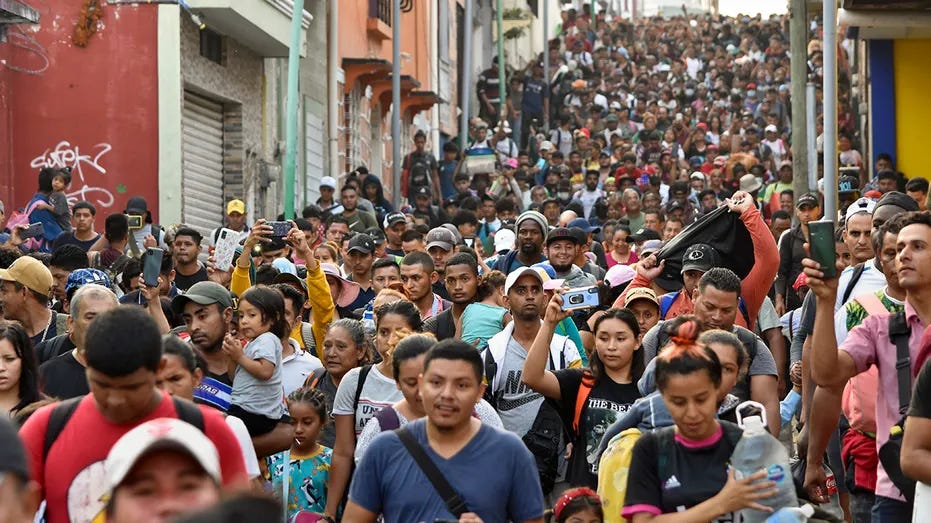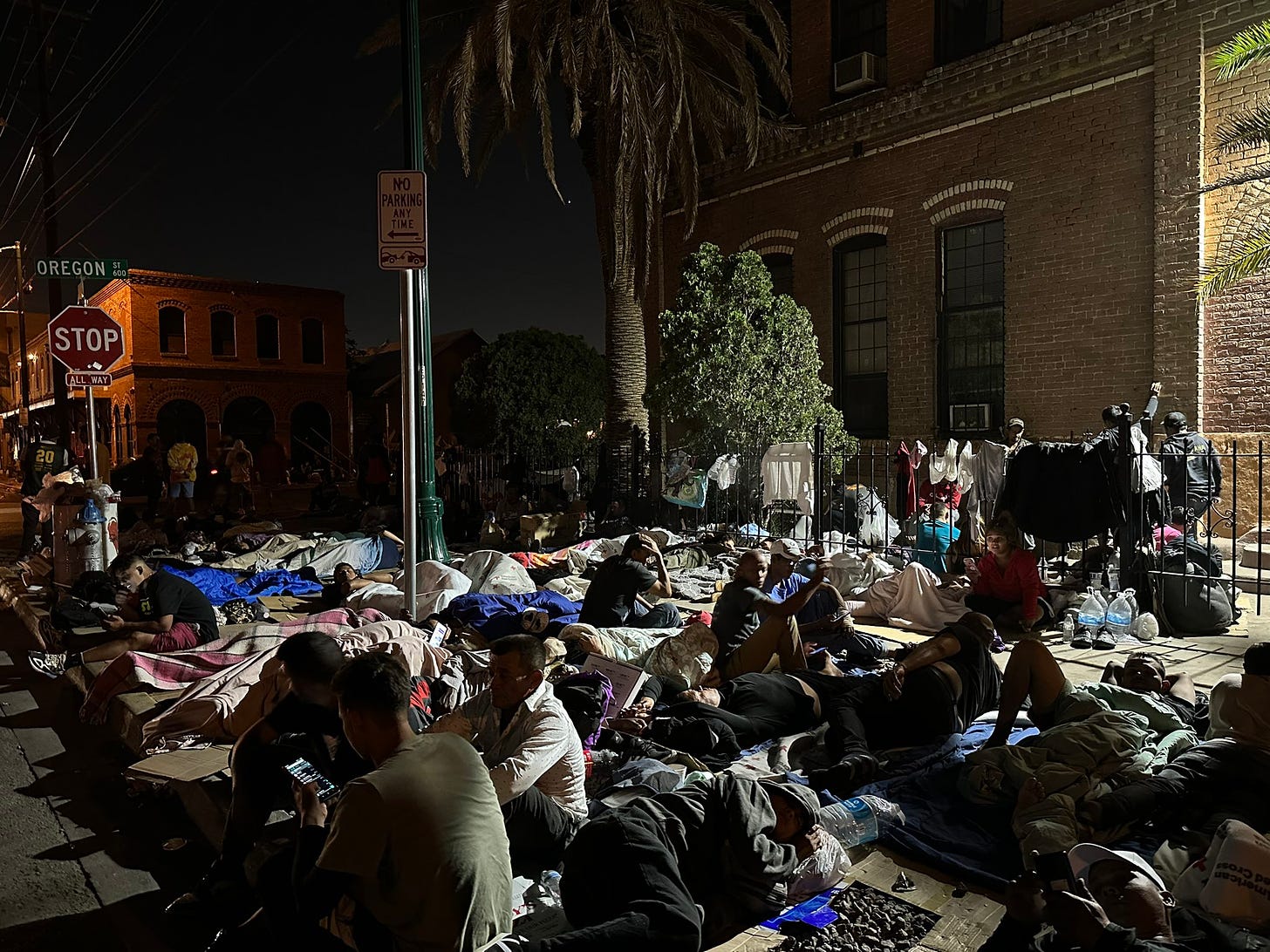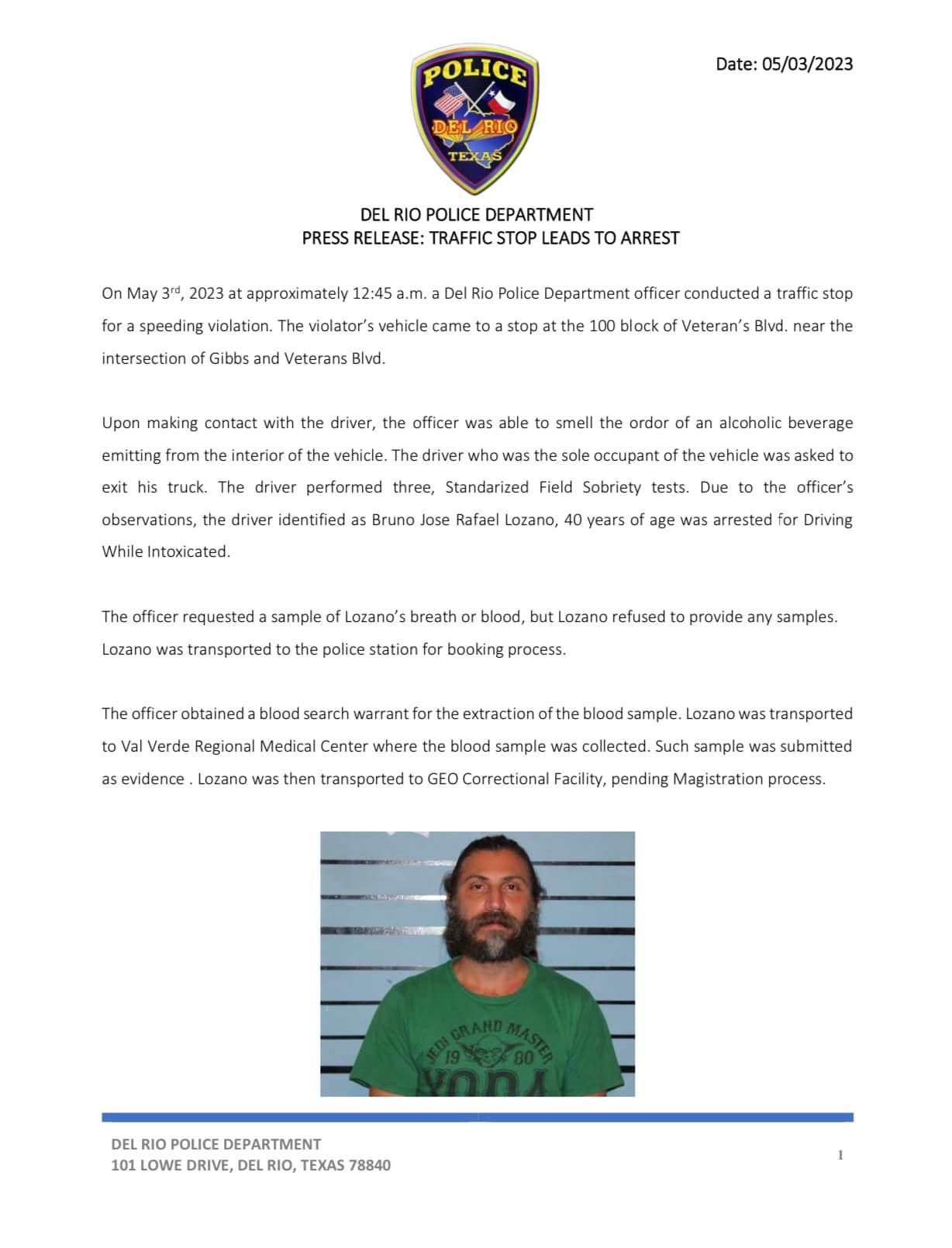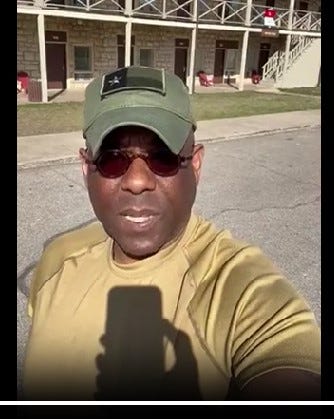Bracing for Title 42's End
And, "Reckless Pursuits," High Profile Drunk Driving, and Extra-Territorial Processing Centers
Good morning, friends,
Looking ahead, most everyone running up and down the Southern border these days is bracing for the departure of Title 42, the health and safety regulation that some critics say has been getting abused and misapplied— used to facilitate speedy removals of large numbers of foreign nationals attempting to enter the United States illegally.

Even though Kinney County lacks a port of entry and would theoretically be less affected than other border areas there will still be a noticeable change in the ‘weather.’
We won’t bore you with an exhaustive breakdown and recitation of all the various nationalities clustering for entry in the RGV and other border areas— the various nationalities plowing their way through the Darien Gap in Panama— all of that stuff can easily be found elsewhere in broad detail, all depicting the tens of thousands of additional individuals that even the most conservative estimates say are waiting for Title 42’s departure before pouring across the border.
We’ve been told the Federal Government expects to be busing roughly 1,000 people a day up out of the Rio Grande Valley, into the Del Rio Sector, just to get them into the extra processing facilities in Carrizo Springs and other communities in the sector which includes Val Verde County, Maverick County, and Kinney County.
Many have already seen the footage of migrants piled up on the streets of El Paso this week— covering the sidewalks with nowhere else to go. How much worse is that going to get?
We’ve been darkly amused by some of the online nonsense— border crisis deniers, let’s call them, who think they’re so clever, posting comments like “How can you tell they’re migrants? They look like regular folks that are just hanging out to me.”
It’s either the most pathetic low-effort trolling in internet history— or we are witnessing the growing online expression of a new body of American Eloi— always online and raised in various cities like Austin, San Antonio, and San Francisco and grown accustomed to the sight of homeless camping out on every corner in large numbers and unable or unwilling to distinguish between migrants and the homeless they seem to presume are normal.
Let’s talk about current events in Kinney County. Let’s talk about some of what’s been keeping us so busy since last we wrote.
Tense moments early Tuesday morning (05/02), after an Operation Lone Star-related pursuit by the Texas Department of Public Safety came to a stop right in front of the BISD campus.
District Officials were quickly contacted and the campus entered what's called a "secure state."
According to the Kinney County Sheriff's Office 8 suspects bailed out of the vehicle. Six were captured almost immediately. Two others, including the driver, were captured a short time later.
"The driver was trying to blend in with the kids, caught him trying to sneak into the gym," said Kinney County Sheriff Brad Coe.
This is the second time in two weeks that DPS has initiated a stop inside the city limits-- something Kinney County leaders say they want to try and avoid.
"We're always working with state troopers and their supervisors, stressing how we have miles and miles of highway outside of the city limits where we can pull people over with much less risk to the safety of local residents," said Sheriff Coe.
—Text from a news release sent to local press in Kinney County
This is probably one of the biggest pieces of local friction, with off and on reporting going back for months from NBC News, the Texas Tribune and others highlighting local concerns that high speed pursuits by State and Local law enforcement might lead to needless deaths of innocent bystanders on the highways and city streets in Kinney County.
At one point, it seemed as though there was a higher level of co-ordination with DPS troopers arriving from outside the area to assist in patrolling. It seemed as though each new arrival had to participate in some kind of a briefing where concerns about not engaging in pursuits inside city limits were drummed home along with briefings about helicopter and drone asset availability. Now, it seems like some of that has stopped— with troopers increasingly engaging on Ann Street at times that many local residents view as the most dangerous— afternoon periods right before students exit the campus at Brackett Independent School District. Ann Street is basically the town’s main thoroughfare, and a convenient route to take for smugglers heading north toward Edwards County in a bid to avoid Border Patrol waiting in Uvalde County.
There are many reasons why troopers might think it a good idea to engage inside the city limits. The one we hear most frequently is that it’s safer for them. Other troopers, local deputies, and border patrol are much closer if there’s a need for backup. That said, many in the community would seem to agree that the risk to bystanders far outweighs this— given how almost the entirety of those getting pulled over are non-violent. Even so, one must acknowledge that it only takes one dangerous individual to cause a world of hurt.
Just ask the folks of San Jacinto County and Los Terrenos Colonia near Houston.
We didn’t plan to say much about the San Jacinto County killings this morning. It’s been covered pretty exhaustively, and many of the remaining questions are far beyond our own boundaries.
Questions about the suspect’s comings and goings. The comings and goings of his family members that were apparently shielding him from law enforcement. The clues that the alleged shooter, Fernando Oropreza must’ve had some kind of extensive ties to the criminal underground. We’d be remiss not to link to reporting by perennial favorite Todd Bensman, highlighting signs that Oropreza had some affinity for “Santa Muerte.”
Here’s Bensman again— exploring the very existence of the Colonia where the shootings happened and how it has changed the fabric of the communities around it.
Many will beat their breasts about the failures of DHS in not deporting many of these people involved in this case and they will ultimately be correct in doing so, even as it all might feel a little performative in some cases.
It is performative.
As tragic as the whole thing is— as outrageous as the immigration facts surrounding the suspect’s existence in the United States are— this is nothing new.
We’ve lost count of all the recent cases involving illegal foreign nationals who’ve repeatedly broken the law in the United States and have been able to hop back and forth across the border seemingly at will.
Some may manage to continue breathing fire over this sort of thing— but the bellows of our own internal outrage-furnace feel a little wheezy from all of the use.
Angel Maturino Resendiz, José Inez García Zárate, and now Francisco Oropreza. Oropreza hasn’t been convicted yet, but it seems all but certain he will be joining a long and vile brotherhood of illegal border crossers who have committed pointless and horrific crimes in the United States creating vast amounts of unease and concern in many communities around the country in volumes far greater than some would say their individual acts actually warrant.
And yet, by the very creation of such unease, one can comfortably argue that their acts warrant exactly the amount of unease that they create. It is a thing that insists upon itself— a statement of reality, no matter how one might wish people would view matters differently.
What occurs to yours truly, is the fact that these are the actions of lone individuals acting contrary not only to their own best interests, but also the best interests of the cartels and other organized crime figures that are benefiting from so much of the misery that’s enabled by the current border crisis.
As vile and possibly outsized the results of these crimes are— how much worse are all of the activities that seem to have been passing under everyone’s radar?
The child trafficking that many have tried to deny, but now seems indisputable as the New York Times highlights elements of it. The ongoing enslavement of so many workers by the cartels. The chaotic messes that are spreading up from the overrun border to wreck the interior lives of many American cities, not the least of which is Chicago— where outgoing Mayor Lori Lightfoot is begging Texas Governor Greg Abbott, “No Mas!”
We mentioned the Darien Gap earlier. The US Government is expanding and creating new processing centers there and elsewhere in Central America. This is something that is raising alarm bells on both the right and left sides of the border issue.
Indeed, our comments elsewhere about the creation of these extra-territorial processing centers have led to some new subscribers from outside our usual channels. Welcome— we hope our obvious bias in some areas of the crisis hasn’t been too off-putting.
Here’s what we said:
That’s the whole thing— there’s something hinky about having extra territorial “processing centers.”
Privatization of many aspects of government is turning out to be a real double-edged sword.
Taxpayers are told privatization represents savings. But one wonders if that’s even certain.
What is certain, is that governments are better able to shroud whatever’s happening from outside attention.
If sunlight is the best disinfectant, privatization is the equivalent of drawing the curtains, darkening the room, and then shrugging the shoulders later on when someone wonders why there’s a bunch of mold around.
—Public Comment made on Substack’s “Notes” feature by yours truly
One of the hallmarks of the border crisis these last 2-and-a-half years has been the obvious efforts by the Federal Government to obscure and smudge all of the details of what’s happening— the better to deny that the border is in any crisis at all. To attempt painting it all as the tortured overreactions of a bunch of rural Texans and cynical Republicans trying to leverage racism for votes. Please.
Migrants have been getting shuffled all over the country in ways that defy all claims that they’ve been fully vetted and processed. The very language has been tortured and abused— definitions changed and stretched to help complicate and support statements that beggar belief.
There is no crisis. The border is secure. Missing children? No such thing.
Privatization and Obscurement is actually a topic with tendrils that we believe extend far beyond just the border crisis— far beyond just the Federal Government and extending into state and local governments all over the country in ways that we’re actually biting our tongue to avoid exploring in a newsletter that is probably already too long.
So, keep your eyes open for that future topic— perhaps tomorrow morning.
In other local-area news— word has reached us that former Del Rio Mayor Bruno Lozano has been pulled over in Del Rio, Texas and accused of driving while drunk.
Lozano rose to some national prominence as the City’s first openly gay mayor— and for his actions during the Haitian event under the port of entry which saw many thousands from mostly Haiti camp out in a bid for asylum, constructing huts and other structures from the locally growing “carrizo cane.”
Here’s the press release by Del Rio Police:
Not much to add, except to note that at one time, some folks thought Lozano might become a bright rising star for border Democrats and state and national politics. But, as detailed in a recent interview in The Atlantic, Lozano’s experience as Mayor during the Southern Border Crisis soured him on the job as he singled national Democrats out for their response or lack thereof.
We imagine it wasn’t so simple— and that there are many frustrations both personal and common that can also contribute to a night of bad decisions as we all seem to be witness to here. That is to say, it’s probably a stretch to blame this on political frustrations alone.
Fortunately, it appears Mr. Lozano, if actually guilty of drunk driving, has harmed no one but himself. We hope things sort themselves out in the best way possible and he’s able to get back on track.
And finally, this morning— last week Kinney County hosted national and statewide political figure Retired US Army Lt. Col. Allen West.
Lt. Col. West spent almost an entire week here, staying at the Fort Clark hotel, and pitching in at the Sheriff's Office where he could-- mainly just wanting to get a feel for the day-in-and-day-out reality of the Border Crisis in Kinney County.
As part of that, he spent more than a few hours out at the County Impound lot, helping County Employees prepare for the upcoming vehicle auction.
Lt. Col. West maintains a small podcasting and video enterprise online, where he told his viewers that it's one thing to know a place like Kinney County is getting overrun-- it's quite another to see some of the physical evidence in the form of so many cars that have essentially been abandoned by their owners after getting impounded.
Along the way, Lt. Col. West was also involved in one of the more awkward aspects of policing the Southern Border Crisis, as the driver of a BMW 5-series made bail and paid to get his car out of impound.
"It kinda hurt me, knowing that here I was, turning his keys back over to this gentleman who tried to smuggle people into the United States of America-- an American Citizen," said West in one of the regular video-logs he produces online.
Another aspect of the border crisis that many in the area might take for granted, but which apparently caught the Lt. Colonel off guard was the fact that some area ranchers have had to weld or bolt metal ladders to sections of their fence lines. In a sense, he observes, they are aiding and abetting illegal immigration-- assisting travelers in getting over their fences-- but that they almost have no choice, economically, when having to deal with the constant threat of destruction to their property otherwise.
—Text from news release sent to local press in Kinney County
Lt. Col. West’s experience in Kinney County is kind of illuminating— living so closely with the day-to-day, one hesitates to predict what it is that will stand out to someone from outside.
We’re going to paraphrase one of West’s more striking impressions here, as he noticed something along the lines of: “It’s a warm spring day— but there don’t seem to be any children out.” We’ve probably failed to capture the sentiment verbatim, but it is essentially accurate.
He’s not wrong. There seems to have been a decision made and repeated all over town by many households to keep the kids indoors. If they’re not out on the streets, maybe they won’t get run over by smugglers trying to avoid law enforcement.
And it’s not just the small fry. Folks accustomed to seeing students from Brackett High School jogging out to the track field on the edge of town have noticed they’re not out either. This is something that’s happened for decades. PE in Spring? You’re jogging to the track field, boys and girls.
Not anymore. Too much risk.
Anyway, that should do it for this morning. Thanks for being here for yet another ramble. We hope it’s been informative. But more than that— we hope you’re lined up for a great day and a better weekend. Life goes on, even in the middle of an international humanitarian crisis.
Dust off the grill if you haven’t already— and get your charcoal ready.
Just y’know, ditch the Bud Light, yeah? Or not. You can probably get a screaming good deal on a six pack right now.
As always, the newsletter is an independent work product, put out into the world without any oversight from our bosses at our day job at Kinney County.
It should not be mistaken for any kind of an official communication. Any mistakes, bias, or other misdeeds are entirely our own.
Have a great day, and we’ll try and be here tomorrow for that promised discussion about how privatization in some areas is leading to obscurement in government.





